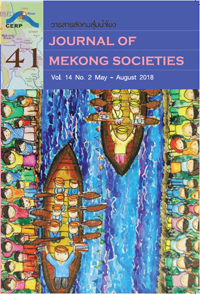The Vernacular City as Ordinary Cultural Heritage
Main Article Content
Abstract
The concept of urban conservation has primarily emphasized elegant art and architecture related to the monarchy and the elite, while ignoring ordinary cultural heritage based in local communities. This article examines the concept of the vernacular city based on ordinary people’s ownership. The four objectives of this study are the following: 1) to review the paradigm shift in cultural heritage relating to the vernacular city concept, 2) to categorize the old community district based on ordinary cultural heritage concepts, 3) to explore the meaning of ordinary cultural heritage through Asset-Based Community Development (ABCD), and 4) to propose the management and protection of ordinary cultural heritage. The outcome of the study is twofold: 1) understanding the importance of spirit beliefs and folklore relating to ordinary cultural heritage, and 2) integrating such folklore into urban conservation planning.


